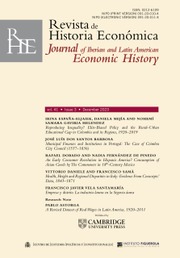Article contents
CAPITAL IN A FRONTIER ECONOMY: PORTUGAL, 1230–1500
Published online by Cambridge University Press: 16 December 2019
Abstract
In this paper we show that Portugal benefitted from comparatively low-interest rates from the 13th century onwards, well before the generalised drop in interest rates in Europe. Contrary to the thesis that frontier economies struggle with high-interest rates and scarcity of capital, we find that the country's low and stable interest rates can be explained by its wide availability of land, combined with monetary stability and a favourable institutional network. These conclusions are built upon an entirely new dataset of interest rates and returns on capital for Portugal in the period 1230–1500.
Resumen
En el presente artículo demostramos que Portugal se benefició de tasas de interés bajas desde el siglo XIII, antes, por tanto, de que su descenso generalizado se dejase sentir en el resto de Europa. Contrariamente a la tesis que sostiene que las economías de frontera sufren por la falta de capitales, en el caso de Portugal, la amplia disponibilidad de tierra (aunada a condiciones institucionales favorables, en particular a la estabilidad monetária) indujo tasas de interés bajas. Estas son las conclusiones a que hemos llegado después del análisis de datos inéditos sobre tasas de interés y rendimientos del capital en el país entre 1230 y 1500.
Keywords
- Type
- Articles/Artículos
- Information
- Copyright
- Copyright © Instituto Figuerola, Universidad Carlos III de Madrid, 2019
Footnotes
Faculdade de Economia, Porto, Portugal. ahenriques@fep.up.pt
References
REFERENCES
- 3
- Cited by


